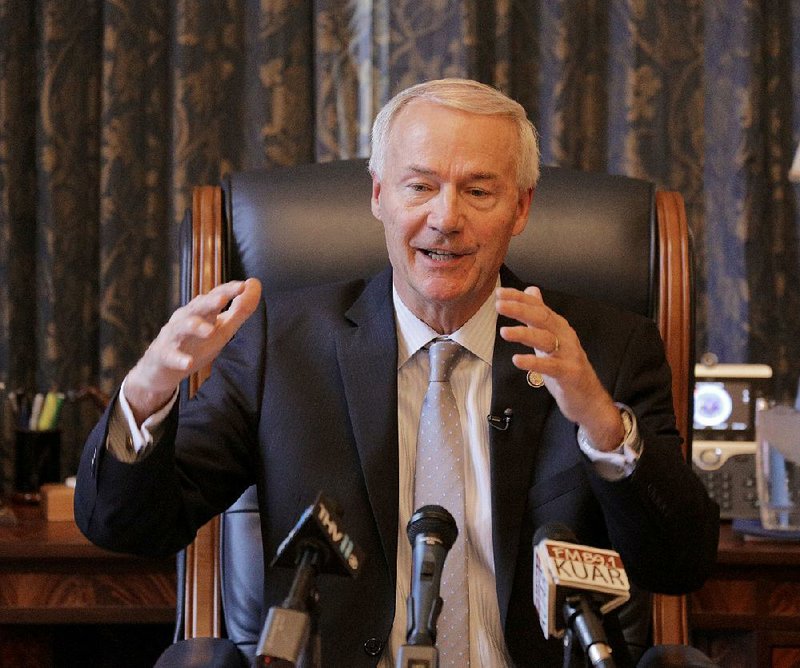As Arkansas colleges reckon with a shift that stops nursing students with federal Deferred Action for Childhood Arrival status from receiving state licenses after graduating, the number of known students affected by the change has climbed.
At least nine students at four Arkansas universities and colleges have been affected by the change, which was disclosed during a meeting of nursing educators after the start of fall classes, according to officials at 19 schools who have responded to an Arkansas Democrat-Gazette survey.
Meanwhile, Gov. Asa Hutchinson said he will not request a "specific review" into whether the Arkansas State Board of Nursing previously licensed nurses who have deferred status, which is extended to illegal aliens who arrived in the U.S. as children.
Sue Tedford, the nursing board's executive director, has said the agency will stop issuing licenses to candidates with deferred status. The change aligns with long-standing state law and policies that define who qualifies for professional licenses, but it marks a departure from the nursing board's practice since the federal program, frequently called DACA, was established in 2012.
[U.S. immigration: Data visualization of selected immigration statistics, U.S. border map]
Tedford has said the Missouri State Board of Nursing tipped her off to the issue over the summer and that she's not sure how many people with deferred status previously received state nursing licenses.
Not all colleges and universities track immigration status, so it's difficult to pin down the number of affected students.
"We do not quantify and measure DACA enrollees," said Steve Cole, chancellor of Cossatot Community College of the University of Arkansas in De Queen, where more than one-fourth of students are Hispanic. "Could there be some in our nursing program? Sure, absolutely."
Roughly 4,700 Arkansans received deferred status, granted to qualifying people between the ages of 15 and 36, before President Donald Trump's administration announced last month that it would wind down the program.
Three nursing students at the University of Arkansas for Medical Sciences have deferred status, spokesman Leslie Taylor said. One nursing student at Arkansas State University is affected, spokesman Tom Moore said. Officials at Northwest Arkansas Community College in Bentonville and Northwest Technical Institute in Springdale said last week that a combined five students at their schools were affected.
All nine students have been notified. One student at the Springdale college withdrew from classes this week and has been offered a tuition refund. The other eight remained in classes as of Tuesday, officials said.
The Deferred Action for Childhood Arrivals program has granted a deportation reprieve, work permits and access to temporary Social Security cards to hundreds of thousands of people nationally.
Recipients of the deferred status can enroll in college, work legally, open businesses and buy homes, but the federal program does not guarantee access to professional licenses, which fall under the domain of state lawmakers.
Tedford, who could not be reached for an interview Tuesday, previously said the nursing board would not investigate how many people with deferred status were previously licensed or revoke those licenses unless directed to do so by Hutchinson, Attorney General Leslie Rutledge or staff legal counsel.
Hutchinson said he will not request a review but did not directly say in response to emailed questions whether he feels any licenses granted to people despite their deferred status should be revoked.
"Only those individuals with a legal status in the United States should be issued professional licenses," Hutchinson said.
Deferred status is not legal status. Nursing licenses must be renewed every two years, according to state regulations.
"Attorney General Rutledge will work with Gov. Hutchinson and the State Board of Nursing to ensure that the law is properly followed," Rutledge spokesman Judd Deere said.
Of 19 schools that responded to phone calls or emails by Tuesday evening, eight said they do not track whether students have deferred status. Officials at seven other schools reported they have no affected students.
Taylor, of UAMS, on Friday said the university was "not aware" of any students affected by the shift. She said Tuesday that that had changed.
"At this point, we're just letting [the students] know what we've been told," Taylor said.
Officials, including Taylor, said schools learned of the change Sept. 29 at one of the twice-yearly Nurse Administrators of Nursing Education Programs meetings.
"Our faculty left with a great deal of confusion around this issue and are waiting for further clarification and direction from the State Board of Nursing," said Jeff Weaver, spokesman for National Park College in Hot Springs, which had three representatives at the meeting.
Cossatot Community College, one of the schools that doesn't track immigration status, has not announced the state nursing board's shift to its students because the college has not heard directly from the state board, Cole said.
"I'll be the first to tell you that if something comes down and it's in stone ... we obviously would follow that guidance," Cole said. "I don't have 100 percent clarity to take that step."
Trump's administration announced in early September that it would end Deferred Action for Childhood Arrivals, which President Barack Obama established through executive action.
People whose deferred status expires March 6 or later will not be eligible for a renewal unless Congress acts on the issue. Trump has urged Congress to "legalize DACA" but has since sent lawmakers a list of contentious legislative priorities -- including funding for a wall on the U.S.-Mexico border -- that he wants paired with the legislation.
A Section on 10/11/2017
